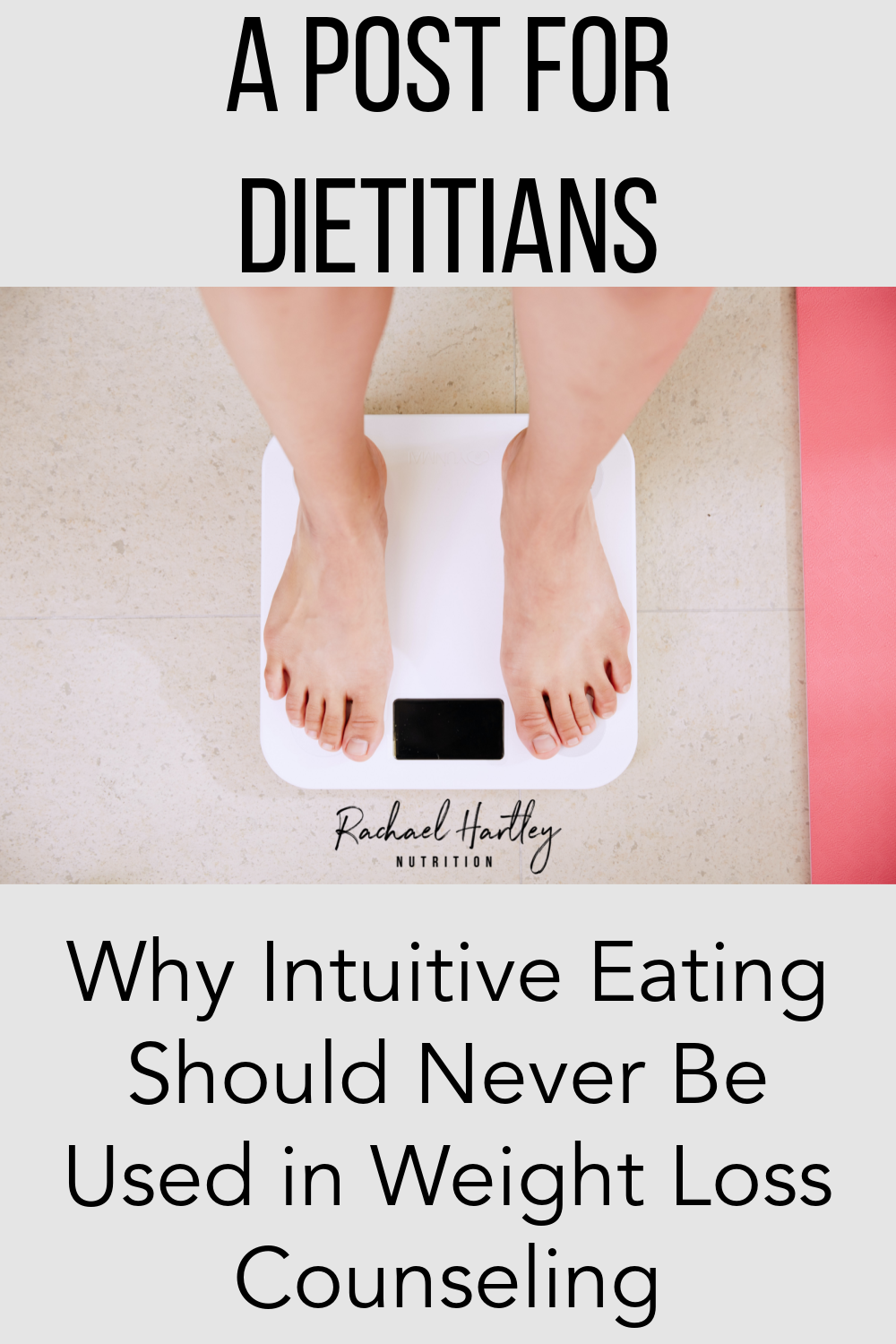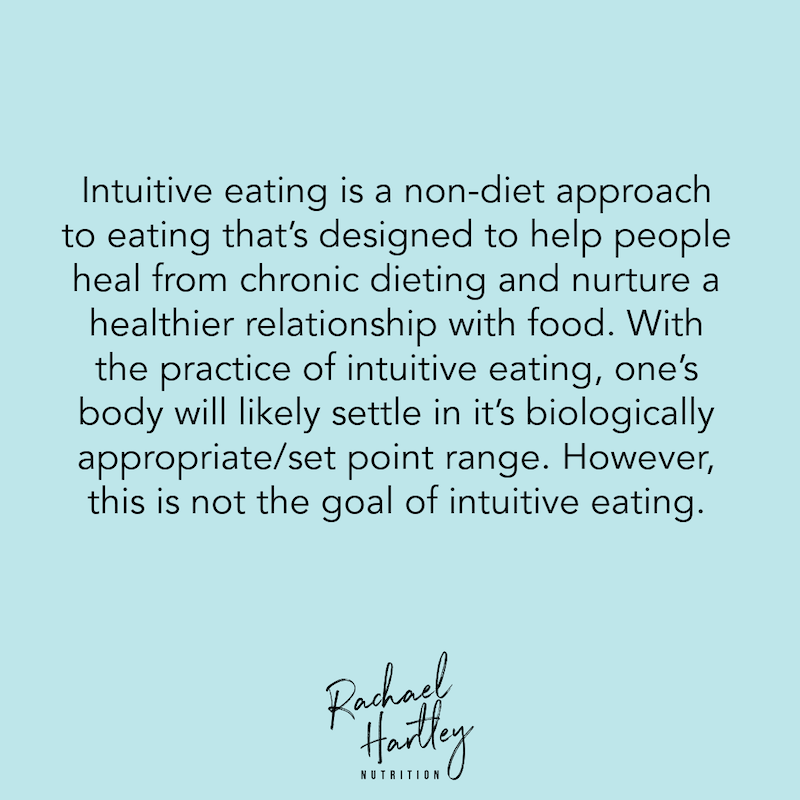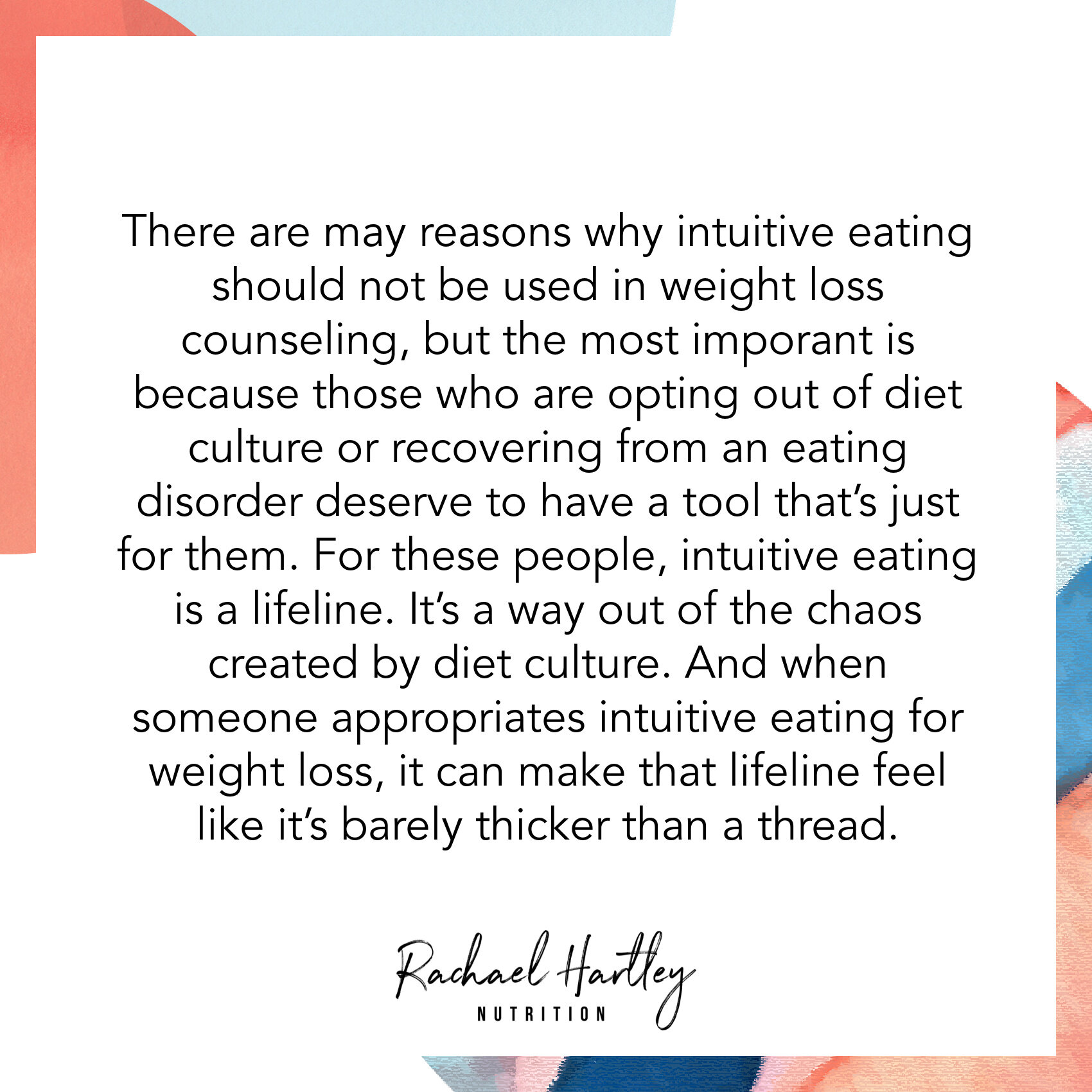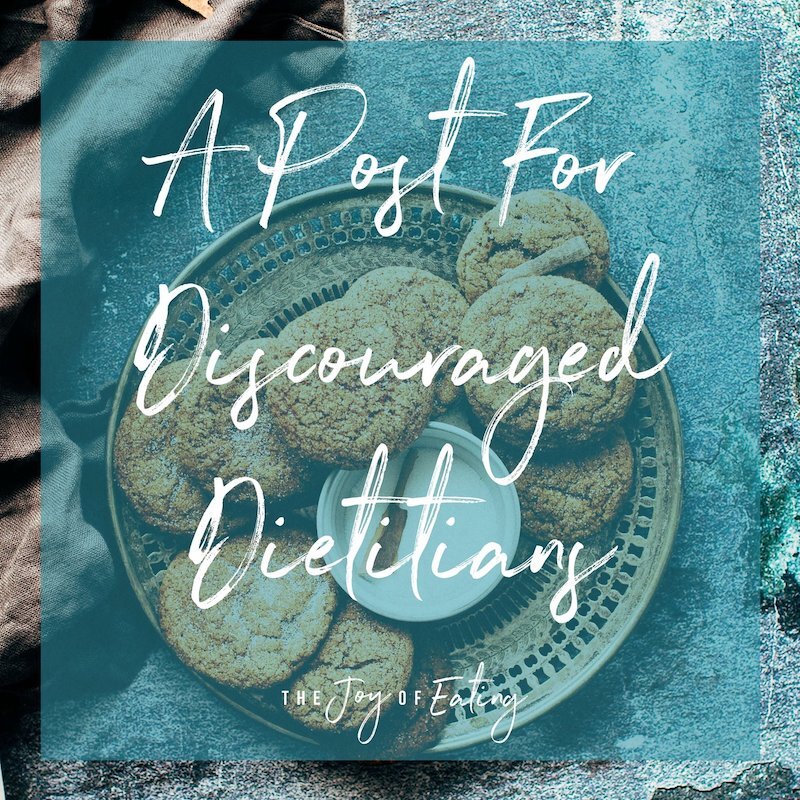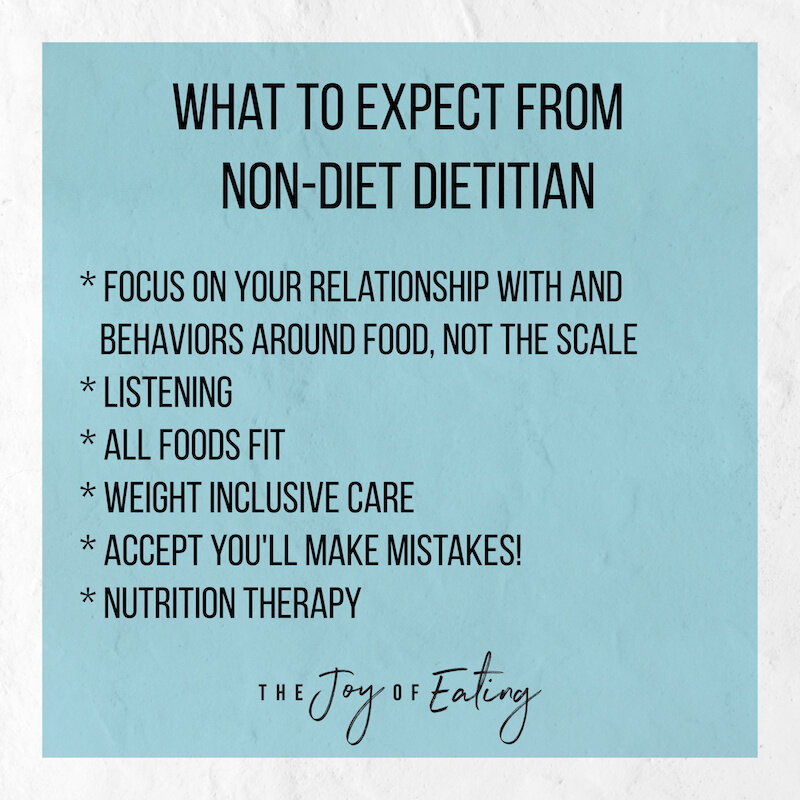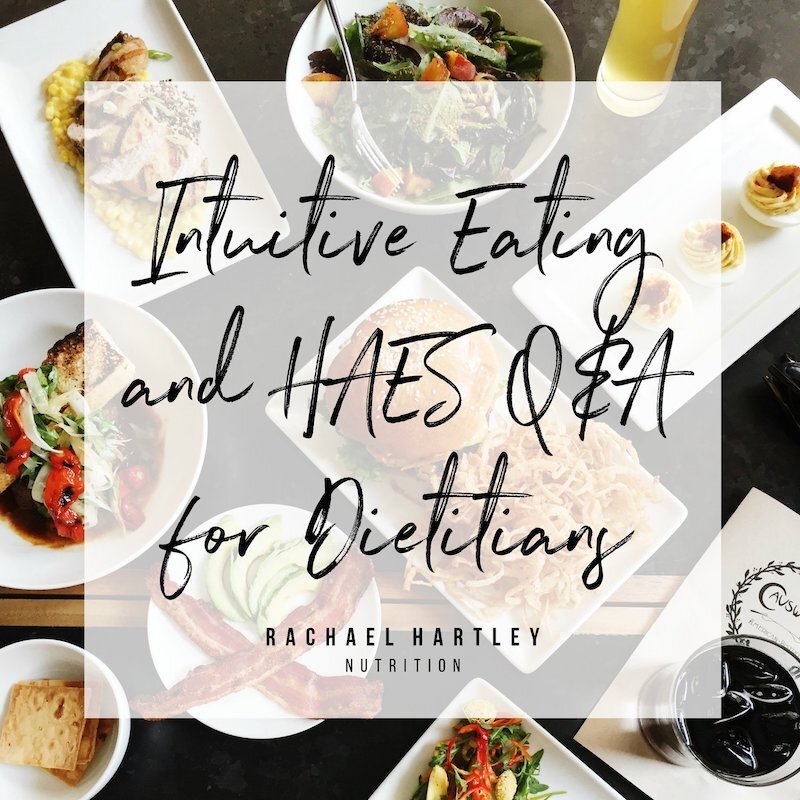A Post for Dietitians: Why Intuitive Eating Should Not Be Used in Weight Loss Counseling
With intuitive eating growing in popularity and becoming, dare I say it, trendy, so has the number of providers co-opting intuitive eating to promote dieting. This post is for dietitians to learn more about why intuitive eating should NOT be used in weight loss counseling, and how doing so causes harm to the people intuitive eating was designed to help.
Today’s blog post is one that’s geared at dietitians, for those who are new to the world of non-diet, weight inclusive practice, and have questions about working with clients who desire weight loss. It’s also for those who are already in this community and need a resource for educating their peers.
And tbh, this post is also for me. There’s this dynamic that keeps happening in dietitian facebook groups/online communities, where one person asks a question or shares an article/post implying or outright saying it’s OK to use intuitive eating in weight loss counseling. Then seasoned non-diet practitioners provide free education and respond why it’s not an appropriate use for intuitive eating, people get defensive, others chime in “why can’t we all just come together???” (as if groupthink is an appropriate answer), people accuse others of being “attacking”, people start responding with passive aggression….and y’all, I am sooooooo exhausted with it. When those conversations inevitably come up again, I wanted to create a resource that had as much information and nuance as I could pack in to simply link and share for those who were interested in learning.
If you’re a non-diet RD, feel free to add comments or email any additional nuance, spaces for clarity, or other suggestions. This is a working document, and I am definitely not THE authority on intuitive eating. As a provider in a thin body, I am positive I have many blind spots. This post is informed by years of working as a non-diet dietitian with clients in large and small bodies, struggling with everything from active eating disorders and disordered eating to various medical conditions to general nutrition concerns, pretty much all of which had some desire for weight loss. Because if they didn’t desire losing or controlling their body size at some level, they’d already be a pretty intuitive eater. This post is also informed by years of clinical supervision, including with one of the authors of Intuitive Eating, and many, many, many, conversations with my peers, including those who identify as fat.
This post is also informed by my own mistakes in practice, especially when I was first learning about intuitive eating and Health at Every Size. Please know that I have made all the mistakes I talk about in this post, and this is not some kind of holier than thou sort of thing. I know that I caused very real harm to people both before I became an intuitive eating dietitian, and as I was learning about the paradigm. My learning is not done, and I am sure I will continue to make mistakes today, mistakes that I hope to learn and grow from.
One thing I love about working in this non-diet space is that for the most part, people are really OK with being wrong, learning and growing, so much more so than I’ve observed in other areas of dietetics. Pretty much all of us have already had the experience of going through our weight-centric dietetics curriculum and providing weight-centric nutrition therapy before recognizing the harm and stigma we were perpetuating - that really primes you for being OK with being wrong! Within intuitive eating/non-diet communities, there’s always a lot of conversation, disagreement and discussion. There’s not a lot of places in IE where everyone agrees! However there is one thing we all agree on: that it is inappropriate to use IE as a weight loss tool.
First, What is Intuitive Eating?
Let’s start with a brief review of what intuitive eating is for context. Intuitive eating is a non-diet approach to eating that’s designed to help people heal from chronic dieting and nurture a healthier relationship with food. The goal is to help people tap back into their body to help guide eating, rather than relying on external diet rules. Essentially, it’s a tool for helping people learn how to eat in a way that feels physically and emotionally good for them, rather than trying to eat in a way that (temporarily) lowers the scale.
With the practice of intuitive eating (along with general self care), one’s body will settle in it’s biologically appropriate/set point range. This is one’s “healthy” weight, although I hesitate to use that phrase because someone may not necessarily be healthy regardless of their body size - illness and disease are a normal part of being a human, at all body sizes. That is frustrating, but also a part of life. One’s biologically appropriate weight is not the same thing as BMI, and may be smaller, larger, or the same size as when one started practicing intuitive eating. While this “settling” of body size occurs with intuitive eating, it is not the goal of intuitive eating. And of course, one still might experience fluctuations in weight because bodies change all throughout life for dozens of reasons outside of food and eating.
Where Does The Intuitive Eating for Weight Loss Myth Come From?
Some of the misconceptions around intuitive eating and weight loss stem from oversimplified explanations of what it is that proliferate social media and news media. Intuitive eating is so much more than eating when you’re hungry and stopping when you’re full. There are 10 principles of intuitive eating, and as Evelyn Tribole says, you can’t cherry pick principles and call it intuitive eating. If you’ve only learned about intuitive eating through social media, I highly recommend reading the latest edition of Intuitive Eating. Or if you need a shorter review, check out my intro to intuitive eating blog post.
I will note, earlier editions of Intuitive Eating (the first two) contained confusing language about weight, and definitely had some implications of weight loss. The authors of Intuitive Eating have been really open and clear about their evolution over the years, and about the fact that intuitive eating is not to be used for intentional weight loss for maaaany years now. However, I do think it’s important to say that some of this misconception comes from the fact that the authors themselves weren’t clear about this in the beginning. It’s a reminder to all of us that we can learn and grow!
Still more confusion around intuitive eating comes from the term non-diet. When people try to promote intuitive eating as a weight loss tool, oftentimes they interpret non-diet as non-fad diet. As in, intuitive eating is anti-keto/low carb/low calorie/intermittent fasting/whole 30/any program that markets itself as a capital letter D Diet, but OK with “healthy, balanced eating” for weight loss.
In reality, any change to eating, physical activity or general lifestyle with the intention of weight loss is a diet. That includes what many dietitians will call “healthy lifestyle changes”, if those changes either promise or imply weight loss as a result. I know some dietitians reading this may feel defensive about the semantics. And I certainly understand that the word diet is also often used as a shorthand for dietary pattern (as in “Rachael eats a diet that includes a lot of fancy cheeses.”). You are more than welcome to disagree with that definition of diet, however in intuitive eating, that is what is meant when we say non-diet, and that is something that the authors of Intuitive Eating have been extremely clear about.
That said, while intuitive eating discourages “healthy lifestyle changes” with the intent of weight loss, healthy lifestyle changes for other goals, like chronic disease management, improving energy, or general wellness, is totally OK! Not only that, but these healthy lifestyle changes are part of intuitive eating, under principles like gentle nutrition and pleasurable movement.
Why Intuitive Eating Should Not Be Used in Weight Loss Counseling
A better question would be “should we be doing weight loss counseling at all?” That might sound kind of bonkers, especially as dietitians who have been trained in an extremely weight-centric paradigm. However, we were also trained in an extremely science-based paradigm, and when you look at the science on dieting, it shows pretty definitively that very few people lose significant weight and keep it off for good. Furthermore, it shows that the harm of dieting, both physically and mentally, making it a risky intervention for something that’s thrown around willy nilly. I’m going to skim over this question for the sake of writing a blog post and not a book, but if you’re new to intuitive eating, I’d encourage you to take some time and explore the following resources:
- Weight Science: Evaluating the Evidence for a Paradigm Shift (journal article)
- Slim Chance for Permanent Weight Loss (journal article)
- Probability of an Obese Person Attaining Normal Body Weight (journal article)
- Body Respect (book)
- Anti-Diet (book)
The most important reason to not use intuitive eating for weight loss is because those who are opting out of diet culture or recovering from an eating disorder deserve to have a tool that’s just for them. Please trust the many, many voices out there who have spoken out to say how diet culture and anti-fatness have harmed them - hating their body, thinking about food most of their waking hours, life threatening eating disorders, depression, anxiety, missing social events, and so on. If you want to better understand this, I highly recommend reading the book What We Don’t Talk About When We Talk About Fat, or listening to interviews on Christy Harrison’s podcast Food Psych.
For many people, intuitive eating is a lifeline. It’s a way out of the chaos created by diet culture. And when someone appropriates intuitive eating for weight loss, it can make that lifeline feel like it’s barely thicker than a thread. This isn’t a made up concern by practitioners who are gatekeeping what intuitive eating is. It’s a thing we see regularly in our practice. Almost once a week I have a conversation with a client who has seen something online where intuitive eating was co-opted or misrepresented, and it has caused real harm. I’ve also worked with a number of clients who had first worked with a dietitian or coach who was selling intuitive eating for weight loss, and it made our work together incredibly challenging. Not only did they have to unlearn diet culture’s BS, but also many things they had learned from their last provider.
Implying or outright saying intuitive eating can help you lose weight also hinders ones ability to practice intuitive eating. Below is a list of each of the principles, and how using intuitive eating for weight loss would interfere with their adoption:
Reject the Diet Mentality - Should be self explanatory, but this principle is all about rejecting the idea that there is a new or better way to lose weight out there. Selling intuitive eating for weight loss is literally saying intuitive eating is the new and better way to lose weight.
Honor Your Hunger – If someone is focused on not eating “too much,” it’s hard for them to trust their body and honor hunger cues, and not second guess them.
Make Peace With Food – It’s impossible for someone to give themselves unconditional permission to eat the foods they enjoy if weight loss is the priority.
Challenge the Food Police – Again, if weight loss is the priority, it’s really hard to not moralize food choices. Whether it’s calories, grams of carbs, points or whatever, when pursuing weight loss, different foods are automatically assigned more or less value.
Discover the Satisfaction Factor – While certainly plenty of diets advertise “pleasurable” food (some more laughably than others), I think most people can agree that when weight loss is the priority, you can’t really explore what foods are pleasurable.
Feel Your Fullness – Hunger and fullness are probably the two principles of intuitive eating that are most heavily co-opted by diet culture. Certainly, if you want to teach clients about hunger and fullness cues for weight loss outside of the intuitive eating paradigm, by all means, go for it. Intuitive eating doesn’t “own” body cues. Just know that when weight loss is front and center on the brain, it’s really hard to bring that non-judgmental awareness that’s necessary for mindfully observing your body cues and responding to it’s needs.
Cope With Your Emotions With Kindness – Food is rarely the go-to way of coping with emotions when one is eating adequately and appropriately throughout the day, and giving themselves permission to eat the foods they enjoy.
Respect Your Body – While it makes total sense that someone would want to lose weight, and certainly they have all the permission the world to try, it’s important to distinguish trying to change your body from respecting it. It’s hard for a client to respect and accept their body if you, as their trusted healthcare provider, are giving them the message that it’s not OK by promoting intentional weight loss.
Movement – Feel the Difference – For many people, exercise with the goal (or sometimes even just the thought!) of weight loss can be enough to take something that might be otherwise pleasurable and turn it into a punishing chore.
Honor Your Health With Gentle Nutrition – When you try to engage with nutrition, but the goal is weight loss, it introduces a level of emotional restriction, which can fuel chaotic eating in the same way as physically restricting food.
Intentional Weight Loss vs. Weight Loss as a (Possible) Side Effect of Intuitive Eating
While intuitive eating does not align with dieting and intentional weight loss, that does not mean intuitive eating is anti-weight loss. Some people will lose weight with intuitive eating, just as some people will gain weight, and others will stay the same size. As I have joked before, if a client loses weight with intuitive eating, we don’t throw donuts and them screaming “you’re doing it all wrong!” While society may offer more praise and validation to someone who loses weight as a result of eating more intuitively (or just people who lose weight in general), as providers, we aim to look at these body changes neutrally.
There is a difference between intentional weight loss, and the weight loss that may occur as a side effect of eating more intuitively. As intuitive eating providers, we need to be careful with the language we use to describe the latter. While it’s not the same thing as co-opting intuitive eating for dieting, it still can be unintentionally read by someone as “I can help you lose weight.” What do you say to that person when they don’t lose weight? Or if they gain weight? How is that assumption or belief hindering them in eating more intuitively? If you’ve been “called-in” by another provider on this kind of language, it’s OK! I can look back on my earlier writing and definitely see a lot of this that I regret and have learned from. We all unintentionally cause harm, and can learn from it. Conversely, you’re allowed to disagree with the feedback - I just hope that you’ll listen to it first rather than reflexively getting defensive.
So, How Do You Help a Client Who Wants to Lose Weight?
Perhaps you’ve read all this, and you’re interested in wanting to incorporate intuitive eating into your clinical practice, but are stuck knowing what to do if a client wants to lose weight. I hear this come up a lot in conversations online about intuitive eating, and I honestly think discomfort over how to have this conversation with clients is a big reason for much of the unintentional co-opting of intuitive eating.
One thing I think is important to hold in mind is that pretty much everyone who seeks out intuitive eating wants to lose weight. As I said earlier, if they didn’t, they would already be a pretty intuitive eater. The desire to lose weight is a practically universal one in this world we live in, and because of that, I think there are very few people who will come to you 100 percent completely on board with giving up dieting. If you’re not helping people who want to lose weight, you’re not introducing intuitive eating to the people who need it most.
There’s no “right” or “wrong” way to handle a client who wants to lose weight, and certainly a lot of it depends on what context you’re seeing the client. Are you seeing them clinical or inpatient? Is it a referral from a physician for weight loss, or did the client find you on the internet? Having solid counseling skills is essential, and so is just being willing to show up to your sessions as a human being and have conversations, rather than selling your client on a “right” way to do things, in this case, intuitive eating.
While there’s (unfortunately!) not a guidebook for how to handle these conversations, there are a few things that are helpful to keep in mind. The first is being able to distinguish wanting to lose weight from the active pursuit of weight loss. The latter is not compatible with intuitive eating. That doesn’t mean you can’t work with a client who is actively trying to lose weight (hello that’s like 99% of eating disorders!), but it does mean being really clear on both your role as a non-diet provider and identifying non-weight goals you’re working on together. Sometimes these clients are some of the most rewarding, as you get to process with them in real time how dieting fuels their unwanted eating behaviors and stress around food. Other times, it’s just not a good fit and they aren’t ready to put dieting on the back burner. That’s OK! You’re allowed to wish them well, and remind them they are welcome back if things change. Providing a client with information and some space to process it is powerful work.
It’s also helpful to remember that if you are an intuitive eating dietitian who understands the current research on weight science, the physical and psychological harms of dieting, and benefits of a weight inclusive approach, not providing weight loss counseling is simply a matter of practicing ethically. If you understand this research, then you should understand that it’s not ethical to provide weight loss counseling if a client is asking for it the same way that it wouldn’t be ethical for a doctor to give an unhelpful or harmful medication to a patient who was asking for it. Dietitians often fear that it’s not providing client-centered care to provide weight loss counseling if someone requests it, but it’s not client-centered to provide a risky medical treatment that isn’t supported by research. If you do agree to weight loss counseling, provide informed consent and discuss the risks involved with the approach, as well as the research on long term success rates. Here is an informed consent form you can use.
Perhaps your stuck point is that you’re in an environment that makes it hard to have these conversations, like inpatient clinical. It’s helpful to remember that intuitive eating is simply one tool you can utilize in your practice. You can learn and grow in your knowledge and skills around intuitive eating, and it can inform your practice, but that doesn’t mean it has to be the main tool you use for each client. For example, if you’re an inpatient dietitian and are seeing a patient who was just diagnosed with diabetes and wants to lose weight, it would be weird AF to go into their room and launch into a diatribe on the 10 principles of intuitive eating.
However, your knowledge of intuitive eating could influence the work you do with them. For example, you might provide them with education on the importance of not eliminating carbs and talk about how doing such often leads to restrict-binge patterns that are harmful for glucose control. Or, you might help them identify pleasurable forms of movement, or teach nutrition advice for diabetes management in a gentle way. You can even drop some kernels of knowledge that engaging in health promoting behaviors is more helpful than weight loss – all without saying the word intuitive eating!
Yikes, I Just Realized I’ve Been Using Intuitive Eating For Weight Loss
Deep breaths. It can feel really icky to realize when you’re doing something unintentionally harmful. Please know that pretty much every intuitive eating practitioner can look back with a feeling of regret and shame at their earlier work, myself included. We were all trained in a weight centric paradigm, and given completely inadequate resources for counseling from a non-diet perspective - or just counseling skills in general!
Fiona Southerland, a fantastic dietitian and supervisor (check out her trainings and podcasts, as well as the other Fiona from Australia, Fiona Willer) calls this fence straddling, which happens when you’ve got a foot in two different paradigms. It’s a natural phase when you’re crossing from one paradigm to another, but it’s a problem when you get stuck in that place.
It’s easy to get defensive. To be honest, that’s often my natural reaction to criticism, and I often have to pause myself to take it in for a second. I hope you’ll use this opportunity for learning and growing. Speaking personally, I know that I’ve learned the most through mistakes I’ve made in the past. It feels really icky - even years later I still catch myself cringing at some things – but it’s important to lean into that discomfort, learn and grow.
If you’ve read all this and still don’t want to give up practicing weight loss counseling, that’s totally cool! Honestly. While personally, I don’t agree with it, you don’t have to base your clinical practice based on what other people might think. I think I can speak for other intuitive eating providers in simply asking that you are honest about what services you’re providing, and not using intuitive eating as a marketing tool.
If you’re interested in growing your intuitive eating/non-diet/HAES practice, I encourage you to engage in regular supervision. The aforementioned Fiona Southerland has a free course on what supervision is and how to make the most of it. I work with dietitians providing case consultation, or would be happy to connect you to a supervisor dietitian in your professional or regional area. There’s also many books you can read to learn more, like some of the ones I’ve also mentioned but also Intuitive Eating, 4th edition (duh) and my book, Gentle Nutrition. Not to be too sales-y, but I really think my book is helpful for new dietitians who are trying to incorporate intuitive eating into their clinical practice. There are also many Facebook groups for dietitians who are learning about intuitive eating, and there’s many seasoned practitioners who will help you if you have questions. Two of my favorites are #INSPIRDtoSeek and Weight Inclusive Nutrition and Dietetics.
If this blog post on why intuitive eating should not be used in weight loss counseling was helpful for you, learn more about intuitive eating through my Pinterest board on the topic.

